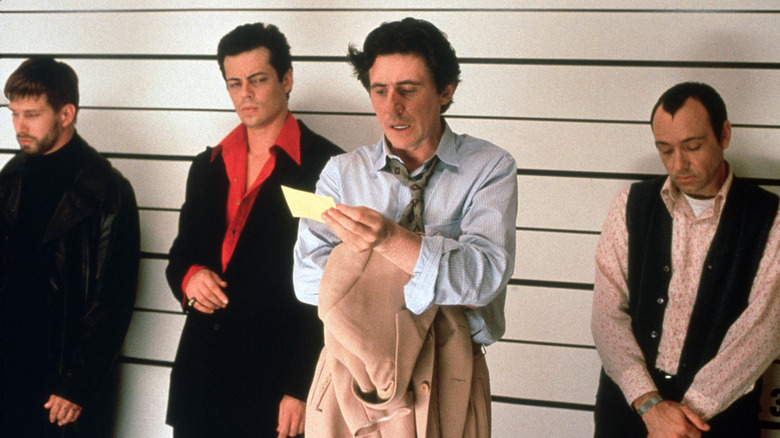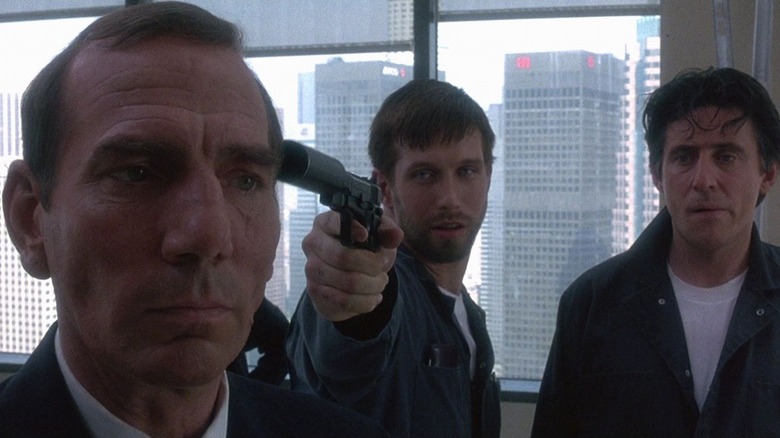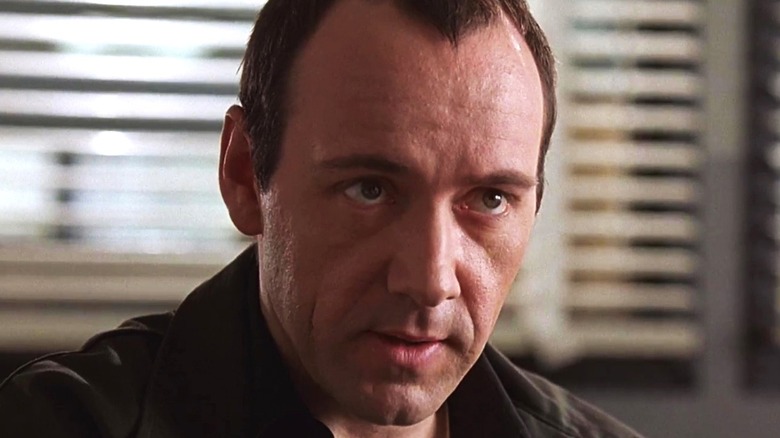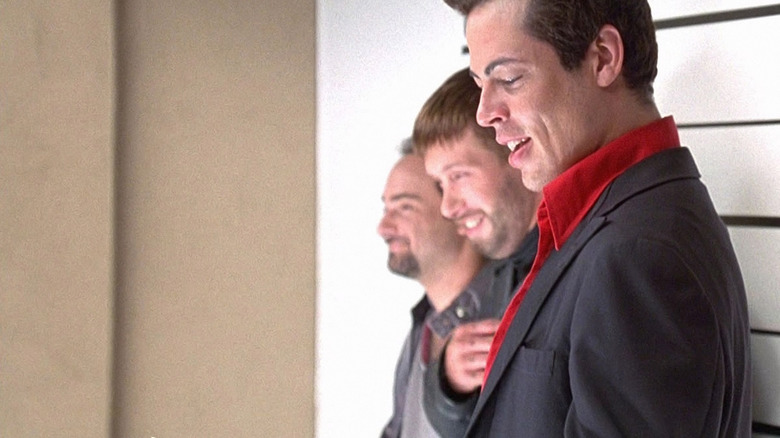The Real-Life Killer Who Inspired Keyser Soze In The Usual Suspects
Casablanca, 1941: You're a small-time crook eyeing up a wealthy-looking gentleman at the bazaar who is paying more attention to his lady friend than what is happening around him. Suddenly, a car pulls up next to you and three police officers hustle you into the back of the vehicle. A few minutes later you're in a cell, but no one tells you why. After they've frogmarched several other men into the cell block they finally say why you've been brought here, and panic rises in your chest. You are suspected of murdering a high-ranking Nazi official!
"Round up the usual suspects" is my favorite quote from "Casablanca." It is uttered at the end by Captain Renault, the corrupt Vichy prefect of police, and there's a lot going on in those five words. First, it marks Renault's step towards the light as he joins the Allies in the fight against the Nazis. It also reveals further depths of corruption in Renault's police force, implying that they regularly lean on a bunch of low-level rogues whenever they need to pin a case on someone or make it go away.
"The Usual Suspects" is a cool title for a movie, too, and that was where it began for Bryan Singer when he spotted it in a Spy magazine article (via Ernest Larson's 2019 book "The Usual Suspects"). The underlying truth of Renault's great quote reflects the basic setup for the film, which Singer originally envisaged as "five guys who meet in a line-up" (via Seattle Times). From this simple beginning, Singer and screenwriter Christopher McQuarrie created one of the key thrillers of the 1990s, with that unforgettable poster and its famous twist ending. At its heart was the dark legend of Keyser Soze, one of cinema's greatest screen villains. A mythic character, it turns out, was inspired by a real-life criminal.
So what happens in The Usual Suspects again?
"The Usual Suspects" opens with the aftermath of a deadly firefight on a ship docked in a Californian harbor. Dean Keaton (Gabriel Byrne) is badly-wounded and helpless as a shadowy figure approaches him. They exchange a few words before the man, who Keaton calls "Keyser," shoots him and blows up the ship. When the police pick through the wreckage the next day, the only survivors are a badly-burned Hungarian gangster and Verbal Kint (Kevin Spacey), a small-time con artist.
Special Agent Dave Kujan (Chazz Palminteri) flies in to question Kint about the shootout. Kint's tale begins with a bogus police line-up involving him and four other men; in flashback, we meet hothead McManus (Stephen Baldwin), his partner-in-crime Fenster (Benicio del Toro), cynical wise-guy Hockney (Kevin Pollak), and Keaton again, a former corrupt cop now trying to go straight.
Kint's convoluted story leads to a lawyer called Kobayashi (Pete Postlethwaite) who claims to work for the shadowy Keyser Soze. To the guys, Soze is an urban legend; a drug runner from Turkey who gunned down his wife and kids after they were attacked by Hungarian mobsters trying to take over his turf, before exacting murderous revenge and vanishing. He's "a spook story criminals tell their kids at night."
Kobayashi assures the gang that Soze is very real and, since they all unwittingly stole from him at some point, they are now in his debt. They're tasked with raiding a ship where a big drug deal is going down and destroying $91 million worth of cocaine. The survivors will get to divide the cash among themselves. With Kint's bail pending in a few hours, can Kujan figure out who Keyser Soze really is and get to the bottom of the massacre in the harbor?
The real-life criminal who inspired Keyser Soze
In "The Usual Suspects," Keyser Soze is a mysterious half-mythic character, but he was inspired by the terrible crimes of a real-life murderer (via George Anastasia and Glen Macnow's "The Ultimate Book of Gangster Movies"). In 1971, John List, an accountant with money troubles and a devout Lutheran, killed his family at his mansion in Westfield, New Jersey. First, he shot his wife and mother. He then proceeded to kill each of his three children the same way after they returned home from their daily activities (via The Sun).
It was no crime of passion. List meticulously planned the killings well in advance, telling the kids' schools that they were going away for a few weeks and canceling the milk run and newspaper deliveries to support the ruse. He even left the lights on to suggest they were still home.
It wasn't until the lights burned out a month later that neighbors called the police, who entered the home and discovered the bodies. By that time List was long gone, having first destroyed all photos of himself (via New York Times). His car was found at JFK airport, but there was no record of him taking a flight. The house stood empty for nine months until it burned down. Arson was the verdict, though no one was ever charged.
List remained on the run for 18 years until "America's Most Wanted" profiled the case, putting together a life-size bust of what he might've looked like at the time. The image prompted 300 calls, one of which led to List in Denver. He was now Robert Clark, a married Lutheran accountant with money worries. In 1990, he was convicted of the murders and sentenced to five life sentences. He died in prison in 2008.
Does The Usual Suspects still hold up?
Despite being the hit that launched Bryan Singer's career, critics weren't all that enamored with "The Usual Suspects;" Roger Ebert only gave it one-and-a-half stars in his review. Nevertheless, it was one of those must-see movies of the 1990s, largely because of that twist ending that people tried so hard to keep a secret.
The film has certainly come to show its age. Its shiny cinematography places it in the mid-'90s, but its visuals hold up far less well than those in "Seven" — a similar film that also came out in 1995, featured Kevin Spacey as a criminal mastermind, and ended on a shocking note. Nevertheless, its devious plot is still fantastically entertaining even when you know the twist, thanks to the clear-eyed storytelling and the excellent performances. For a story this labyrinthine, I was never confused even on my first viewing, which is a testament to Christopher McQuarrie's well-structured screenplay and the deft sleight of hand of John Ottman's editing. (Ottman also contributed the film's evocative score.)
Another thing that dates the film is the copious homophobic slurs. Some might defend it as a sign of the period and the kind of "locker room talk" that a bunch of guys like this might indulge in, but it takes on an especially unsavory aspect with the subsequent allegations made against both Spacey and Singer. Basing Keyser Soze on a crime as heinous as John List's also casts a shadow over the film. I'm not someone whose enjoyment of a film is usually affected by actors or directors disgracing themselves, but these details certainly put "The Usual Suspects" in a different light, adding a darker edge to its already diabolical tale of murder and deception.



